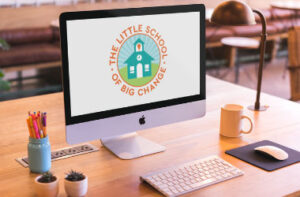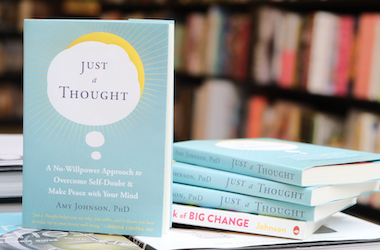Holding yourself in high esteem seems really important, doesn’t it? 
For good reason, I admit. It’s nice to think positive thoughts about yourself and that’s exactly what self-esteem is: making favorable evaluative judgments about good ole’ you.
Self-esteem is about the thoughts and beliefs you have about yourself. And as you know, thoughts and beliefs are not objective, observable facts; they’re subjective judgments and personal interpretations.
As you can see, this is going to get messy—fast. In order to evaluate yourself, you need some standards (i.e., beliefs) you subscribe to, right? You’ll need to invent those standards—or borrow them from somewhere else—in order to judge yourself. Otherwise, how would you know which evaluation to make?
So you invent some definitions to use to decide whether you’re “good” or “bad”. Or you pick some up from your parents, the neighbor kid, your church or the president and you use those to decide whether you’re good or bad. Maybe you decide that if you’re nice, smart, brunette, not too wealthy, straight you’ll judge yourself as “good”. If you’re loud, opinionated, rich, mean, a minority, you’re “bad”.
Then you tally it all up. Not consciously or explicitly, but you’re always keeping a tally. Mostly good judgments? Congratulations! You have high self-esteem. More bad than good and you have low self-esteem.
Of course, part of what really sets you up for trouble is standards that are beyond your control. Like if you decide your self-esteem is based on how well you do at your job or how good a friend you are, eventually you’re going to mess up at work or fight with your friend and you’ll be cornered into judging yourself poorly. Your self-esteem will plummet until you go out and make a new friend or garner some praise from the corner office.
Before you know it, you’re stuck in a cycle where the way you feel about yourself is based on outside circumstances. As those circumstances fluctuate, the way you view yourself dips and soars like a roller coaster.
Self-esteem isn’t sounding so great anymore, is it?
The Alternative to Self-Esteem
The alternative to self-esteem is self-acceptance.
Self-acceptance is just as it sounds: accepting yourself, period. There are no evaluations involved. You don’t have to invent standards and then judge yourself based on them. You just decide to accept yourself regardless of what’s going on around or within you.
Self-esteem is conditional; self-acceptance is unconditional. You’re not chasing the carrot anymore. No more roller coaster.
Self-acceptance is much simpler than self-esteem. But is it easier? No way. Not at first, anyway.
We’re programmed to think in terms of good and bad. We evaluate and judge everything. And we’re programmed to rely on other people’s definitions of good or bad at to become a slave to the conditioned beliefs that pop into our own head. Self-acceptance requires a degree of separation from all of that. The willingness to question your standards and let them go.
Self-acceptance requires letting go of what things look like on the outside and making a decision to love yourself unconditionally, regardless.
If you don’t know where to start…if just waking up tomorrow and deciding to love yourself now feels like too far a stretch, just start with willingness. Be willing accept yourself no matter what without needing to actually do it right away.
Your willingness allows the barriers to start cracking and crumbling and it’ll start to come together from there.
Related Posts:
How to believe in your positive qualities





